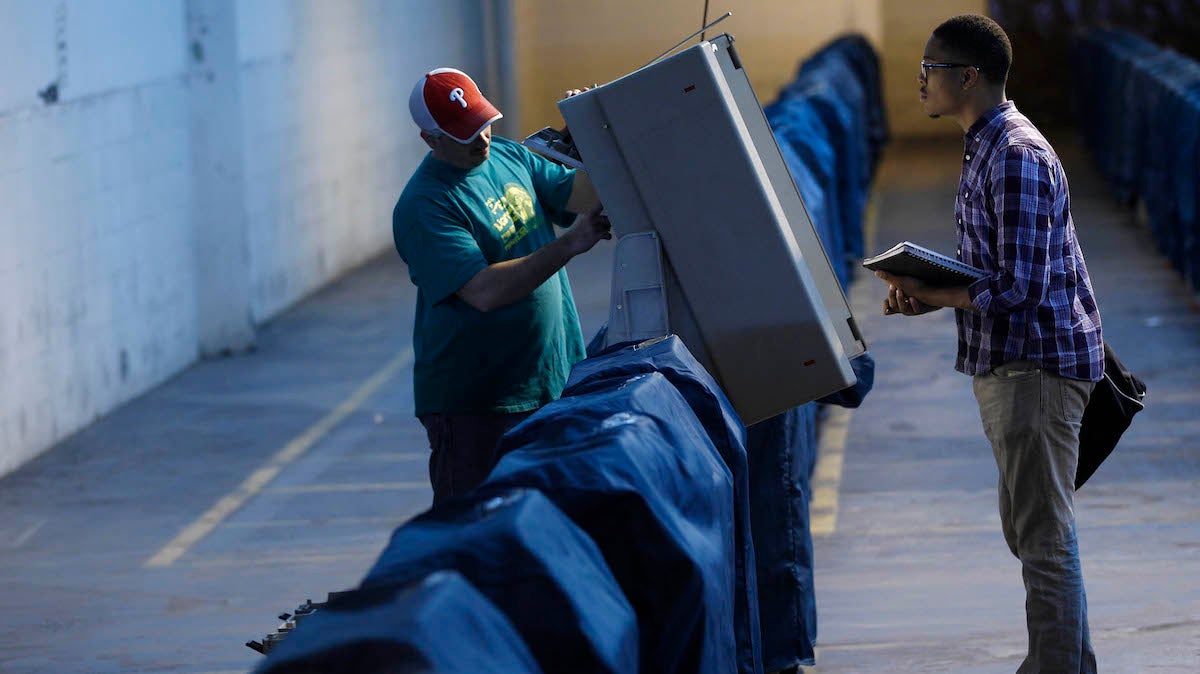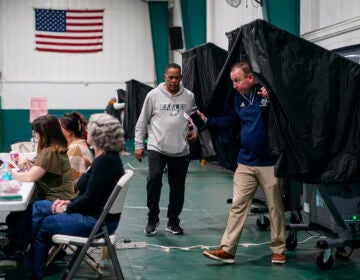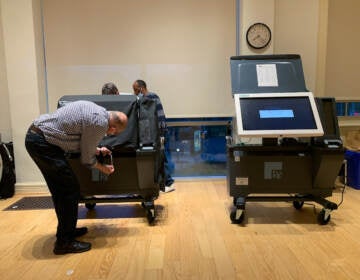What you need to know about the city’s $50M voting system coming this November
The digital machines provide a paper log of each individual vote, not just a tally of the votes cast. Pennsylvania has ordered all counties to replace their voting machines.

Technician Tom Mattia Jr. (left) and Malcolm Kenyatta test a voting machine in 2011 in Philadelphia. (Matt Rourke/AP Photo)
In response to a state mandate, Philadelphia is replacing its voting machines – all 3,735 of them – before the general election on Nov. 5.
The city commissioners Wednesday picked Omaha-based Election Systems & Software to do the job at a cost of $50 million.
“It’s a huge expense for a city, but the governor asked all the counties in Pennsylvania to get new voting systems in place, and the county of Philadelphia is doing what the governor asked, ” said Lisa Deeley, commission chairwoman, after the vote.
The new digital system resembles the current one. Voting machines will still have a “full-face” display, meaning every candidate in every race will appear on one electronic screen.
But there are two big differences. The machines will provide a paper record of each individual vote, a requirement of the state mandate aimed at halting voter fraud and hacking. Poll books – which are used to check voters in before they cast their ballots – will also be electronic, not paper-based.
“These systems, all the systems, had to go through vigorous certification, both on the federal and state level before we could even consider them,” Deeley said. “It wasn’t like we went to Crazy Eddie’s voting machine store.”
The machines will cost the city $27 million up front. The rest of the money is needed to cover the poll books, a new storage warehouse, as well as maintenance and training poll workers and city employees.
Wednesday’s decision didn’t sit well with everyone, including City Controller Rebecca Rhynhart, who called the process of choosing a voting machine vendor “troubling” and “deeply flawed.”
The city’s request for proposals, said Rhynhart, was written to favor Election Systems & Software, the country’s largest manufacturer of voting machines.
The sentiment was echoed by residents who spoke before the vote. They also said the new system is too expensive. Only $22 million has been earmarked for the upgrade in the city’s next capital budget.
“I don’t want to see $20 million extra disappear into the pockets of some company when it could be spent on increasing the pay for poll workers, it could be spent on improving access to the polls for disabled people, it could be spent on our schools,” said Rich Garella, a member of Citizens for Better Elections. “Anything but this.”
Pennsylvania’s directive to install new voting systems was based on concerns that many of the aging machines are difficult to double-check in the event an election’s integrity is questioned.
The commitment became binding months later, when the commonwealth settled a 2016 lawsuit with Jill Stein’s presidential campaign that alleged the old machines weren’t reliable and made recounts difficult. State officials didn’t admit any fault, but their settlement with Stein included a pledge to update the machines by 2020.
The undertaking is expected to cost counties about $125 million.
On Wednesday, Republican lawmakers on the Senate’s Appropriations Committee let officials from the Department of State know that they’re not totally happy with the arrangement.
Sen. Bob Mensch, R-Berks, said the upgrades are unnecessary.
“We have a rush to 2020,” he said. “We have a huge expense to our taxpayers. We have vendors who are using excessively high interest rate proposals. We have governments that don’t have a way to pay for these. And we have no example, none, of a real, legitimate issue.”
Wolf has said he wants the state to put $75 million toward the project over five years — an amount some county officials have said is not enough.
Meanwhile, Deeley said there’s been “some talk” of Philadelphia receiving additional state – and possibly federal – funds to help close the expected funding gap for the new system.
WITF’s Katie Meyer contributed to this report.
WHYY is your source for fact-based, in-depth journalism and information. As a nonprofit organization, we rely on financial support from readers like you. Please give today.





